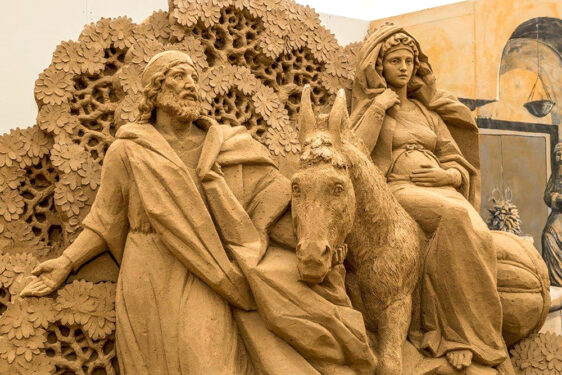
Advent has long been one of my favorite times of the year. One reason I find it so special is the emphasis in the Church’s liturgy on the virtue of hope. Every advent I become more convinced that I need to trust more in God’s love. At one point in my life, actually it was when I was a seminarian, my confessor had me read every book on the virtue of hope that I could find. What a great experience that was for me!
As far back as my years as a high school student I have been bothered by a minor anxiety neurosis. I recall that for several months while I was in high school, celebrating the sacrament of reconciliation was a painful experience. At one point when I was a teenager I would spend thirty minutes examining my conscience and worrying about whether I had recalled all my sins and whether I would confess them correctly. Thanks to some wonderful confessors and priests who were counselors I was able to control the tendency to worry about nonsense and after I was ordained I seem, in God’s providence, to have been successful in helping others who suffered from scrupulosity or some other anxiety neurosis. Perhaps all the reading I did as a seminarian was used by God to help others. God sometimes seems to work that way.
When I was a young priest a special course was offered at Iona College to help priests counsel others with psychological problems. Two of my friends took the course and profited greatly from it. Over the years I was impressed with their psychological insights that they had received from the course. When I had the opportunity to enroll in the course, the course was not explained to me accurately and so I decided not to enroll. I am sorry I did not take the course.
If I had, I might have been able to help many. So each year I welcome advent and its emphasis on trusting in God and God’s love for us, a message which is so central to the season. Each year during the advent season I think of the beautiful message that the Church proclaims in her liturgy in relation to three time periods: the past, the present and the future. During advent the Church seems to review almost all of sacred history, emphasizing God’s love for us and encouraging us to become more profoundly aware of that love and to trust deeply in God because of that love. I believe it is impossible to trust too much. Rather than make us complacent or self satisfied or presumptuous, trusting in God’s love should call us to action. Hope should liberate us and enable us to be more courageous and dedicated. If God is for us how can we lose? I can understand that we can become disappointed when our plans are not fulfilled the way we wish but I don’t think we should ever give in to discouragement.
A God of hope is a God of surprises!
The scriptural passages from the Old Testament that are proclaimed from the altar during advent should not be looked at as history lessons. Rather I suggest they should be looked at as God speaking to us at that moment in the Eucharistic celebration. The readings are God’s living word to us during the liturgy. So the past is not completely past because of God’s presence in the readings. Our hope is not limited to what happened hundreds of years ago but rather it extends to the presence of God in our lives every moment.
Much of the advent liturgy focuses on the approaching feast of Christmas. In every conceivable way the Church tries to deepen our hope in the Incarnate God. No matter how secular the celebrations of Christmas become, I wonder if the profoundly beautiful mystery of God becoming human can ever be completely missed or forgotten. As Christmas approaches we have seemingly countless opportunities to appreciate, perhaps in new ways, the meaning of the Incarnation. While advent points toward December 25th, the future is not just future and we trust in God not just because God is in the future. We can trust in Christ because he is living in the liturgy and in each of us. Hope is rooted not in a God Who is not only in the future. Hope is in a God Who is present.
So in my mind advent points toward the past and it points toward the future but most importantly it points toward the present. We can understand the past better and we can face the future confidently and joyfully because of the presence of God in our lives every moment.
Father Lauder is a philosophy professor at St. John’s University, Jamaica. He presents two 15-minute talks from his lecture series on the Catholic Novel, 10:30 a.m. Monday through Friday on NET-TV.
